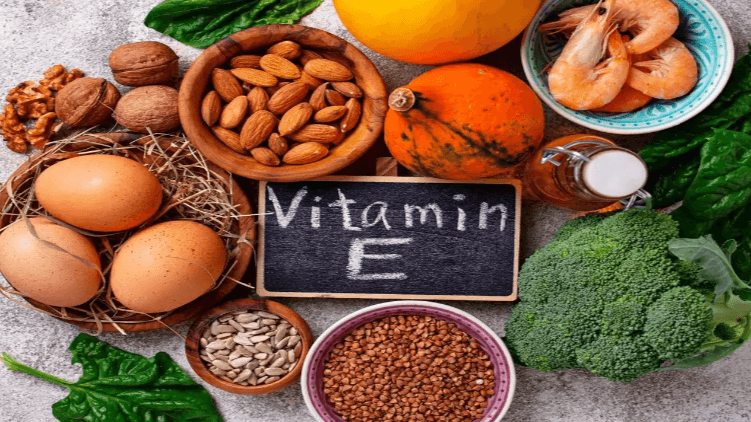wellhealthorganic.com:vitamin-e-health-benefits-and-nutritional-sources

Vitamin E is an essential nutrient known for its powerful antioxidant properties, helping to protect cells from oxidative stress and maintain overall health. This fat-soluble compound includes eight different forms: four tocopherols and four tocotrienols, each contributing uniquely to our body’s functions.
What is Vitamin E?
Vitamin E refers to a group of eight fat-soluble compounds, which include alpha-tocopherol, the most common and biologically active form. These compounds are crucial for maintaining skin health, boosting the immune system, and protecting against cellular damage from free radicals.
History of Vitamin E Discovery
Vitamin E was discovered in 1922 by scientists Herbert Evans and Katharine Scott Bishop. They observed that rats fed a diet devoid of this nutrient experienced reproductive issues. Initially termed the “Fertility Vitamin,” subsequent studies revealed a broader spectrum of health benefits, leading to its classification as Vitamin E.
Types of Vitamin E
Vitamin E is categorized into two main classes: tocopherols and tocotrienols. Each class has four distinct forms: alpha, beta, gamma, and delta. Alpha-tocopherol is the most abundant in the human body and is often the primary focus in dietary supplements and nutritional studies.
Health Benefits of Vitamin E
wellhealthorganic.com:vitamin-e-health-benefits-and-nutritional-sources, Vitamin E offers a wide range of health benefits, from boosting skin health to supporting cardiovascular and immune systems. Here’s an in-depth look at its various advantages:
Antioxidant Properties
Vitamin E acts as a powerful antioxidant, neutralizing free radicals that can damage cells and contribute to chronic diseases. Its antioxidant function is crucial for protecting skin cells from UV damage and reducing inflammation.
Skin Health
Vitamin E is widely recognized for its skin benefits. It helps in moisturizing and healing the skin, reducing scars and wrinkles, and combating conditions like eczema and psoriasis. Its antioxidant properties also make it effective in protecting the skin from environmental damage.
Immune System Support
Vitamin E enhances the immune system by stimulating the production of immune cells that fight off infections and diseases. It also plays a role in modulating immune responses and reducing inflammation.
Cardiovascular Health
Vitamin E contributes to heart health by preventing the oxidation of LDL cholesterol, which can lead to atherosclerosis. Its anti-inflammatory properties help maintain healthy blood vessels and improve overall cardiovascular function.
Anti-inflammatory Benefits
Chronic inflammation is a precursor to many diseases, including heart disease and cancer. Vitamin E helps reduce inflammation by inhibiting the production of pro-inflammatory molecules, thereby promoting overall health.
Eye Health
Vitamin E is vital for eye health, protecting the eyes from oxidative damage that can lead to cataracts and age-related macular degeneration (AMD). Its antioxidant properties help maintain clear vision and prevent eye-related diseases.
Brain Health
Studies suggest that Vitamin E can help protect the brain from oxidative stress and reduce the risk of cognitive decline. It supports nerve health and may play a role in preventing neurodegenerative diseases like Alzheimer’s.
Anti-Cancer Properties
Research indicates that Vitamin E may help prevent certain types of cancer by protecting cells from DNA damage and inhibiting cancer cell growth. Its antioxidant properties play a key role in its anti-cancer effects.
Hormonal Balance
Vitamin E helps regulate hormones, particularly in women. It can alleviate symptoms of PMS, menopause, and other hormonal imbalances by supporting endocrine function.
Hair Health
Vitamin E is beneficial for hair health, promoting growth, and preventing hair loss. It improves scalp circulation, balances oil production, and adds shine to hair by maintaining moisture levels.
Nutritional Sources of Vitamin E
To reap the benefits of Vitamin E, it’s essential to include its natural sources in your diet. Here are some of the best sources:
Natural Food Sources
Vitamin E is found in various foods, ensuring you can incorporate it into your diet through natural means.
Vegetable Oils
Oils such as sunflower, safflower, and wheat germ oil are rich in Vitamin E. They are excellent for cooking and dressings, providing a significant boost to your daily intake.
Nuts and Seeds
Almonds, hazelnuts, sunflower seeds, and pine nuts are excellent sources of Vitamin E. Including these as snacks or in meals can significantly increase your Vitamin E levels.
Fruits and Vegetables
Fruits like avocados and vegetables like spinach, broccoli, and kale are rich in Vitamin E. They can be incorporated into salads, smoothies, and various dishes to boost your intake.
Fortified Foods
Many cereals and dairy products are fortified with Vitamin E. These fortified foods can help ensure you get enough of this essential nutrient, especially if you have dietary restrictions.
Read Also wellhealthorganic.com : key signs of gastroenteritis
Recommended Daily Intake of Vitamin E
Understanding how much Vitamin E you need daily is crucial for maintaining optimal health. Here’s what you need to know:
Dietary Guidelines
The recommended daily allowance (RDA) for Vitamin E varies by age and gender. For adults, the RDA is approximately 15 mg (22.4 IU) of alpha-tocopherol per day.
Age and Gender Considerations
Children, adults, and the elderly have different needs for Vitamin E. It’s important to adjust intake according to age, with specific guidelines for males and females to ensure adequate levels.
Pregnancy and Lactation Needs
Pregnant and breastfeeding women require higher amounts of Vitamin E to support their own health and the development of the baby. It’s advised to consult with a healthcare provider to determine the exact requirements.
Deficiency of Vitamin E
Vitamin E deficiency, though rare, can lead to several health issues. Here’s what you need to know:
Symptoms of Vitamin E Deficiency
Common symptoms include muscle weakness, impaired vision, and neurological problems. A prolonged deficiency can lead to more severe health complications.
Causes of Deficiency
Vitamin E deficiency can result from poor dietary intake, certain medical conditions that impair fat absorption, and genetic disorders. Understanding the root cause is essential for effective treatment.
Risks and Complications
If left untreated, Vitamin E deficiency can lead to chronic health issues such as muscle damage, vision problems, and increased susceptibility to infections. Early diagnosis and treatment are crucial.
Supplementation of Vitamin E
For those who cannot get enough Vitamin E through diet alone, supplements are an option. Here’s how to approach supplementation:
Forms of Supplements
Vitamin E supplements come in various forms, including capsules, tablets, and oils. The most common type is alpha-tocopherol, but mixed tocopherol supplements are also available.
Dosage Recommendations
It’s important to follow dosage recommendations on the supplement packaging or consult with a healthcare provider. Over-supplementation can lead to adverse effects, so it’s crucial to take the right amount.
Safety and Side Effects
While Vitamin E is generally safe, high doses can cause bleeding problems and other health issues. It’s important to monitor your intake and be aware of any potential side effects.
Choosing the Right Supplement
Select high-quality supplements from reputable brands. Look for products that provide natural forms of Vitamin E and check for third-party testing to ensure purity and potency.
Read Also wellhealthorganic.com : remove dark spots on face tang – lemon juice
How to Incorporate Vitamin E into Your Diet
Incorporating Vitamin E-rich foods into your diet can be simple and delicious. Here are some tips:
Meal Planning Tips
Plan meals that include Vitamin E-rich ingredients like nuts, seeds, and leafy greens. Incorporate these into your daily diet through salads, snacks, and main dishes.
Recipes Rich in Vitamin E
Try recipes such as spinach and avocado salad, almond-crusted chicken, or a smoothie with sunflower seeds and kale. These recipes can help boost your Vitamin E intake naturally.
Conclusion
Vitamin E is a vital nutrient with numerous health benefits, from protecting cells against oxidative stress to supporting skin, heart, and brain health. wellhealthorganic.com:vitamin-e-health-benefits-and-nutritional-sources, By incorporating Vitamin E-rich foods into your diet or considering supplements when necessary, you can ensure you receive the optimal amount needed for overall well-being.
FAQs about Vitamin E
What are the main benefits of Vitamin E?
Vitamin E offers several benefits, including antioxidant protection, improved skin health, enhanced immune function, cardiovascular support, and anti-inflammatory effects.
Can I get enough Vitamin E from my diet alone?
Yes, many people can obtain sufficient Vitamin E from a balanced diet that includes vegetable oils, nuts, seeds, fruits, and vegetables. However, some individuals may require supplements due to dietary restrictions or health conditions.
What are the signs of Vitamin E deficiency?
Signs of Vitamin E deficiency include muscle weakness, vision problems, and neurological issues. Severe deficiency can lead to more serious complications if left untreated.
Is it safe to take Vitamin E supplements daily?
Taking Vitamin E supplements daily can be safe if done within the recommended dosage. It’s essential to consult with a healthcare provider to determine the appropriate amount for your needs.
How can I increase my Vitamin E intake naturally?
Increase your intake by consuming more Vitamin E-rich foods like nuts, seeds, leafy green vegetables, and vegetable oils. Including these in your daily diet can help meet your nutritional needs.
Which foods are highest in Vitamin E?
Foods highest in Vitamin E include sunflower seeds, almonds, spinach, avocados, and vegetable oils such as sunflower and safflower oil. Incorporating these foods into your diet can significantly boost your Vitamin E levels.






